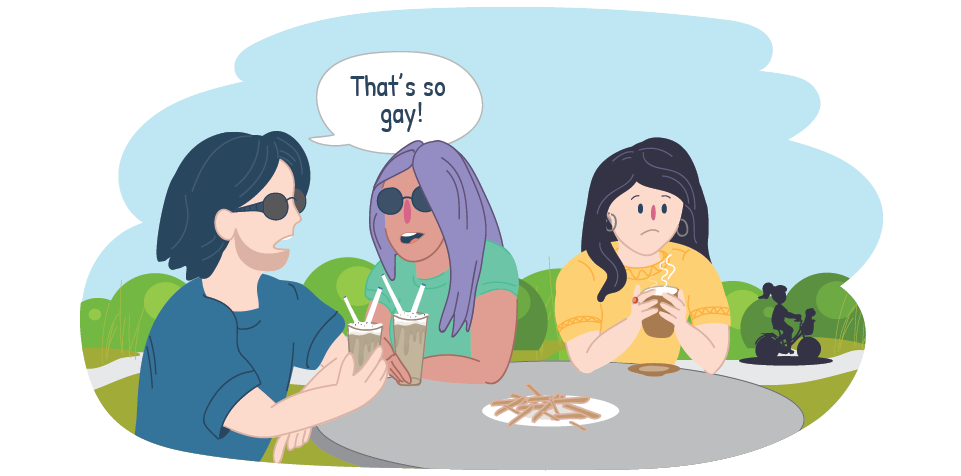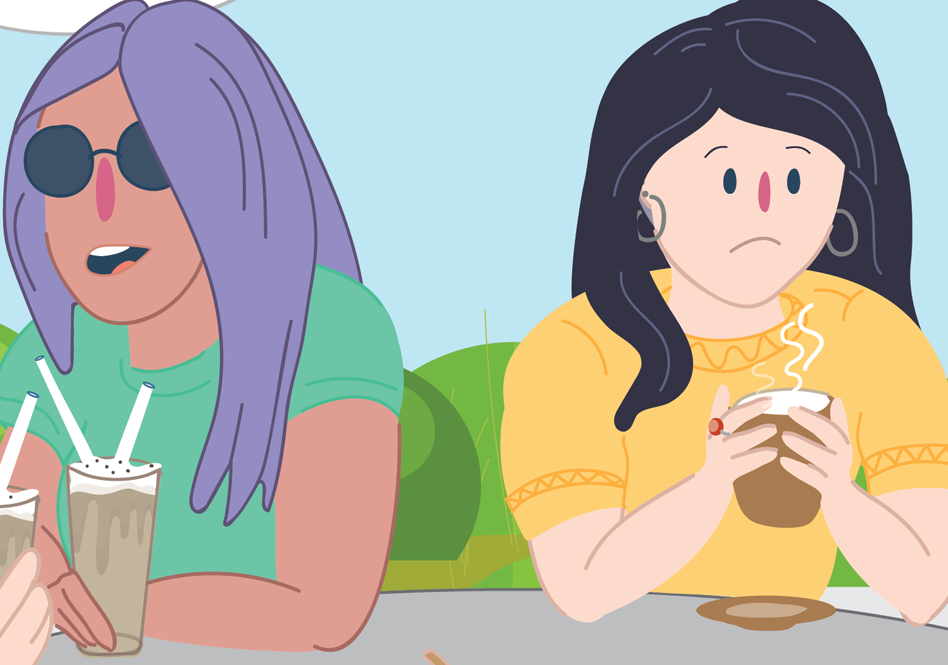Sexual, gender and bodily diversity discrimination
Many LGBTIQ+ people experience discrimination that can affect their lives. Learn more about this below.

This article was written and reviewed by people in LGBTIQ+ communities.
Discrimination and its impact on mental wellbeing
With growing acceptance and recognition in society, most LGBTIQ+ people have good mental health. However, many others experience discrimination that can have a big impact on their health and wellbeing.
- Discrimination means the unfair treatment of someone because of personal qualities like their age, race, gender and sexuality.
- Compared to straight people, nearly twice as many people who aren’t straight are discriminated or abused because of their sexuality. This is even higher for gender diverse and transgender people. People with intersex variations also experience high rates of discrimination, harm and abuse.
- Fear of discrimination and abuse leads to many people hiding their sexuality or gender identity and information about their bodies.
- Discrimination, harm and abuse are some of the main reasons that LGBTIQ+ people struggle with depression, anxiety, substance abuse and self-harm.
- For 80% of young LGBTIQA+ people, discrimination and bullying happens within their school and has a huge effect on their wellbeing and education.
Hetero-cisnormativity and Hetero-cissexism
Why do LGBTIQ+ communities experience discrimination?
Cisnormativity is the expectation that sex assigned at birth matches gender where the only two options are male or female.
People with these attitudes and beliefs see the LGBTIQA+ community as less important, which can lead to discrimination of their rights and the opportunities they can have.
Heteronormativity is the expectation that being straight is “normal”. Heteronormative attitudes and beliefs include believing that people should always be straight and have opposite sex relationships.
Heterosexism is a type of discrimination that sees being straight as normal and superior to not being straight. Cissexism is a type of discrimination that sees having a male or female gender identity as normal and superior to any other gender identity.
Because of the pressure that hetero- and cisnormativity places on people to think that being straight or male or female is the only “normal” way to be, they are thought to lead to discrimination like heterosexism, cissexism, homophobia, biphobia and transphobia.
There are, and have been, lots of examples of heterosexism and cissexism in Australia like: not allowing same-sex people to marry, not allowing people to list non-binary gender identities on their identification and stereotyping LGBTIQA+ people in the media.
Stigmatisation and discrimination against intersex people
People with intersex variations face many of the same problems that LGBTIQ+ people do, but in different ways.
- One of the most concerning is being forced and pressured to have medical procedures to make the bodies of intersex people look more “typically” female or male.
- These practices are based on ideas that people need particular kinds of bodies to be “normal” or to prevent bullying and stigmatisation. They are also based on ideas that people with one kind of body will grow up to have one kind of identity.
- There is no strong evidence that surgery can prevent bullying or stigmatisation, and make “normal” bodies. People with all kinds of bodies grow up to have all different kinds of identities.
"I know that I can live as me."
What is Homophobia, Biphobia and Transphobia?
There are several common words to describe the fear, hatred, discomfort or mistrust people have toward LGBTIQ+ communities:
Homophobia: Means discrimination towards people who identify as Gay, Lesbian or Homoromantic Asexual.
Biphobia: Means discrimination towards people who identify as Bisexual or Pansexual.
Transphobia: Means discrimination towards people who are transgender, genderqueer or don't follow traditional gender norms.
Homo/bi/transphobia can be carried out by anybody – even within LGBTIQ+ communities.
These attitudes and beliefs are usually due to the irrational fears and misunderstandings learnt in families, communities, cultures or religions.
People who are attracted to others of the same-sex or who do not follow binary gender roles can sometimes experience internalised homo/bi/transphobia. This means that they start to believe these negative attitudes and beliefs about themselves and may feel uncomfortable or disapproving of their own sexuality or gender identity. For people with intersex variations, LGBTIQ+ spaces may not always be safe or understanding of them.
Discrimination is a big issue for LGBTIQ+ people. Fortunately, big steps have been taken towards fighting for equality in areas like marriage, employment, housing, health and protection from abuse.
For example, LGBTIQ+ youth attending schools that have anti-discrimination policies are more likely to feel safer. They have almost half the rate of abuse and negative mental health impact compared to schools without these in place.
Discrimination towards LGBTIQ+ people can be overt or subtle. Here are some examples:
Discrimination that is 'overt' is intentional and directed towards a person's sexual or gender identity, like:
Discrimination that is 'subtle' may be unintentional or hard to spot, but makes people feel just as hurt, unwanted or unimportant because of their sexuality or gender identity, like:
How can I help stop discrimination?
Everyone has the right to feel safe and be free from discrimination. Here are some things you can do to help stop it happening:
If you're experiencing discrimination, you don't have to deal with it alone.
It's important to get support from people you trust in LGBTIQ+ communities or their allies.
Check these out too:
Gender Identity
There’s more to gender identity than being male or female. Learn ...
READ MESexual Identity
Relationships come in many forms. Learn more about sexuality and the different ...
READ MEComing Out and Disclosure
Coming Out and Disclosure are about choosing whether you share your sexuality ...
READ MELGBTIQ+: The Ultimate Dictionary
A list of important words you’ll hear used in LGBTIQ+ communities
READ METalking helps! We’re here for you.
No problem is too big or too small.
We're here 24 hours a day, 7 days a week






